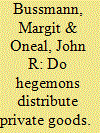|
|
|
Sort Order |
|
|
|
Items / Page
|
|
|
|
|
|
|
| Srl | Item |
| 1 |
ID:
119654


|
|
|
|
|
| Publication |
2013.
|
| Summary/Abstract |
The greater peacefulness of jointly democratic pairs of states is an important finding in research on the causes of war. Here, we outline a set of criteria for evaluating critiques of such robust empirical associations and apply them to two recent articles. Mousseau (2013) claims that contract-intensive economies, as proxied by a measure of life insurance expenditure, account for the democratic peace. However, his research suffers from various problems of analysis and interpretation, including a miscoded dependent variable, a misleading specification for dyadic democracy, a suppression of heterogeneous associations, and a heavy dependence on imputation in which greater than 90% of the values of the central independent variable were (improperly) imputed. We estimate 144 specifications that build from Mousseau's models and control for life insurance expenditures, finding substantial, robust support for the democratic peace. Gartzke & Weisiger () claim that the importance of the democratic peace has declined as the proportion of democracies in the international system has increased; but their tests are misspecified and do not address the issue they raise. There are also serious errors in their data. When these problems are corrected, we find that the peacefulness of democratic pairs has actually increased as the proportion of democracies grew after 1816.
|
|
|
|
|
|
|
|
|
|
|
|
|
|
|
|
| 2 |
ID:
077069


|
|
|
|
|
| Publication |
2007.
|
| Summary/Abstract |
According to power-transition theory, war is most likely when the leading state is challenged by a rapidly growing, dissatisfied rival. Challengers are said to be dissatisfied because the hegemon manages the status quo for its own benefit, rewarding its allies and penalizing rivals. We assess the leading state's ability to distribute the private goods of peace, victory in war, and economic prosperity. States with alliance portfolios similar to the hegemon's are not protected from aggression; nor do they grow more rapidly than countries with which the leading state is not closely allied. The dominant power's allies are more apt to win defensive wars, although the means by which this is accomplished are unclear. On balance, our results call into question the ability of the leading state to engineer satisfaction by distributing private goods. Like hegemonic-stability theory, power-transition theory exaggerates the influence of the leading state over the international system.
|
|
|
|
|
|
|
|
|
|
|
|
|
|
|
|
| 3 |
ID:
065809


|
|
|
| 4 |
ID:
101694


|
|
|
|
|
| Publication |
2010.
|
| Summary/Abstract |
Two studies question whether economic interdependence promotes peace, arguing that previous research has not adequately considered the endogeneity of trade. Using simultaneous equations to capture the reciprocal effects, they report that trade does not reduce conflict, though conflict reduces trade. These results are puzzling on logical grounds. Trade should make conflict less likely, ceteris paribus, if interstate violence adversely affects commerce; otherwise, national leaders are acting irrationally. In re-analyzing the authors' data, this article shows that trade does promote peace once the gravity model is incorporated into the analysis of conflict. Both trade and conflict are influenced by nations' sizes and the distance separating them, so these fundamental exogenous factors must be included in models of conflict as well as trade. One study errs in omitting distance when explaining militarized disputes. The other does not adequately control for the effect of size (or power). When these theoretically informed changes are made, the pacific benefit of trade again appears. In new simultaneous analyses, the article confirms that trade promotes peace and conflict contemporaneously reduces commerce, even with extensive controls for traders' rational expectations of violence. Previous studies that address the endogeneity of trade by controlling for the years of peace - as virtually all have done since 1999 - have not overstated the benefit of interdependence. Commerce promotes peace because violence has substantial costs, whether these are paid prospectively or contemporaneously.
|
|
|
|
|
|
|
|
|
|
|
|
|
|
|
|
|
|
|
|
|